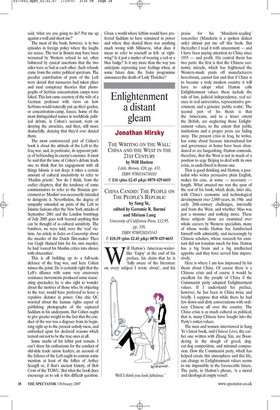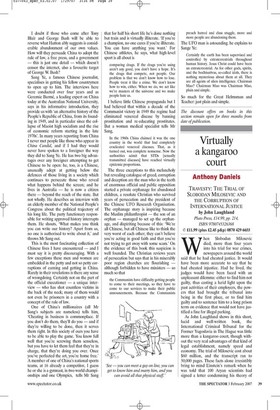Enlightenment a distant gleam
Jonathan Mirsky THE WRITING ON THE WALL: CHINA AND THE WEST IN THE 21ST CENTURY by Will Hutton Little, Brown, £20, pp. 431, ISBN 9780316730181 © £16 (plus £2.45 p&p) 0870 429 6655 CHINA CANDID: THE PEOPLE ON THE PEOPLE'S REPUBLIC by Sang Ye, edited by Geremie R. Barme and Miriam Lang University of California Press, £12.95, pp. 338, ISBN 9780520245143 © £1039 (plus £2.45 p&p) 0870 429 6655 Will Hutton's American-waiterlike 'Enjoy' at the end of his preface, his claim that he is 'fully aware of the literature on every subject I wrote about', and his praise for his 'Mandarin-reading' researcher (Mandarin is a spoken dialect only) almost put me off this book. But thereafter I read it with amazement — and I have been paying attention to China since 1955 — and profit. His central thesis has two parts: the first is that the Chinese economic miracle, which has frightened the Western-made pants off manufacturers hereabouts, cannot last and that if China is to become a truly modern country it will have to adopt what Hutton calls Enlightenment values: these include the rule of law, judicial independence, real science in real universities, representative government, and a genuine 'public realm'. The second part of his thesis is that the Americans, and to a lesser extent the British, are neglecting those Enlightenment values, to the extent that public institutions and a proper press are fading away. The present crisis in Iraq, he writes, has come about because international law and governance at home have been abandoned or are languishing. Hutton contends, therefore, that the West is not in much of a position to urge Beijing to deal with its own crisis, as underlined in theme one.
That is good thinking and Hutton, a journalist who writes persuasive plain English, makes his case, at some — necessary — length. What amazed me was the span of the rest of his book, which deals, inter alia, with China's economic and technological development over 2,000 years, its 19thand early 20th-century challenges, internally and from the West, and whether Mao was just a monster and nothing more. These three subjects alone are examined over whole careers by Western specialists, many of whose works Hutton has familiarised himself with admirably; and increasingly by Chinese scholars, whose research his assistant did not translate much for him Hutton has a big brain and a big intellectual appetite and they have served him impressively.
Here is where I am less impressed by his thesis about China. Of course there is a Chinese crisis and of course it would be excellent for the people of China if the Communist party adopted Enlightenment values. If I understand his preface, however, he has been in China twice and briefly. I suppose that while there he had few down-and-dirty conversations with ordinary Chinese all over the country. The China crisis is as much cultural as political; that is, many Chinese have bought into the Party's rotten values.
The men and women interviewed in Sang Ye's latest book, and Chinese Lives, the earlier one written with Zhang Xin, are floundering in the slough of greed, dogeat-dog competition, and minimal compassion. How the Communist party, which has helped create this atmosphere and this life, can change to Enlightenment values seems to me impossible in the foreseeable future. The party, in Hutton's phrase, 'is a moral and ideological empty vessel'.
I doubt if those who come after Tony Blair and George Bush will be able to reverse what Hutton ably suggests is considerable abandonment of our own values. How will they persuade China to adopt the rule of law, a free press, and a government — this is just one detail — which doesn't censor the internet, also a favourite target of George W. Bush?
Sang Ye, a famous Chinese journalist, specialises in getting his fellow countrymen to open up to him The interviews here were conducted over four years and as Geremie Barme, a leading expert on China today at the Australian National University, says in his informative introduction, they provide us with 'an alternative history of the People's Republic of China, from its founding in 1949, and in particular since the collapse of Maoist high socialism and the rise of economic reform starting in the late 1970s'. In many years reporting from China I never met people like those who appear in China Candid, and if I had they would never have spoken to a foreigner the way they did to Sang Ye. He has two big advantages over any foreigner attempting to get Chinese to be open: he, too, is a Chinese, unusually adept at getting below the defences of those living in a society which continues to persecute those who reveal what happens behind the screen; and he lives in Australia — he is now a citizen there — beyond the reach of the state. But not wholly. He describes an interview with an elderly member of the National People's Congress about the political trajectory of his long life. The party functionary responsible for writing approved history interrupts them. He shouts, 'What makes you think you can write our history? Apart from us, no one is authorised to write about it,' and throws Mr Sang out.
This is the most fascinating collection of Chinese lives I have encountered — and I must say it is pretty discouraging. With a few exceptions these men and women are embedded in the petty and not so petty corruptions of earning and getting in China. Rarely in their revelations is there any sense of wrongdoing. Certainly not on the part of the official executioner — a unique interview — who has shot countless victims in the back of the neck; many of them would not even be prisoners in a country with a concept of the rule of law.
One of China's millionaires (all Mr Sang's subjects are nameless) tells him, 'Cheating in business is commonplace. If you don't do them, they'll do you — and if they're willing to be done, then it serves them right. In this society of ours you have to be able to play the game. You know full well that you're screwing them senseless, but you have to let them feel that they're in charge, that they're doing you over. Once you've perfected the art, you're home free.' A member of one of China's national sports teams, at 16 already a competitor, I guess he or she is a gymnast, in two world championships and one Olympics, tells Mr Sang that for half his short life he's done nothing but train and is virtually illiterate. 'If you're a champion, no one cares if you're illiterate. You can have anything you want.' For Chinese athletes, he says, what high-level sport is all about is comparing drugs. If the drugs you're using aren't any good, you don't have a hope. It's the drugs that compete, not people. Our problem is that we don't know how to lose. People treat it like a crime. We don't know how to win, either. When we do, we act like we're masters of the universe and we make people hate us.
I believe little Chinese propaganda but I had believed that within a decade of the Communist victory in 1949 the regime had eliminated venereal disease by banning prostitution and re-educating prostitutes. But a woman medical specialist tells Mr Sang, In the 1960s China claimed it was the one country in the world that had completely eradicated venereal diseases. That, as it turned out, was complete nonsense. Now the authorities admit that STDs [sexually transmitted diseases] have reached virtually epidemic proportions.
The three exceptions to this melancholy but revealing catalogue of greed, corruption and deception are the man who in the teeth of enormous official and public opposition started a private orphanage for abandoned children, a resolute Christian who survived years of persecution and the president of the Chinese UFO Research Organisation. The orphanage story is inspiring because the Muslim philanthropist — the son of an orphan — managed to set up the orphanage, and dispiriting because of this: 'We're all Chinese, but all Chinese like to think the very worst of each other; they can't believe you're acting in good faith and that you're not trying to get away with some scam.' On the evidence of this book this suspicion is well founded. The Christian reviews years of persecution but says that in his miserably poor region churches are flourishing — although forbidden to have ministers — so much so that the Communists have difficulty getting people to come to their meetings, so they have to come to our services to make their public announcements. Because the Communists preach hatred and class stuggle, more and more people are abandoning them.
The UFO man is astounding. he explains to Sange Ye: Certainly the earth has been supervised and controlled by extraterrestrials throughout human history. Jesus Christ could have been an extraterrestrial. As for other gods, spirits, and the bodhisattvas, so-called idols, there is nothing mysterious about them at all. They are all agents of alien intelligence. Chairman Mao? Chairman Mao was Chairman Mao, plain and simple.
So much for the Great Helmsman and Teacher: just plain and simple.
The discount offers on books in this section remain open for three months from date of publication.





















































 Previous page
Previous page